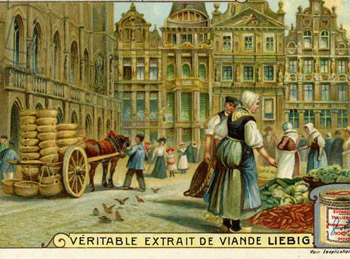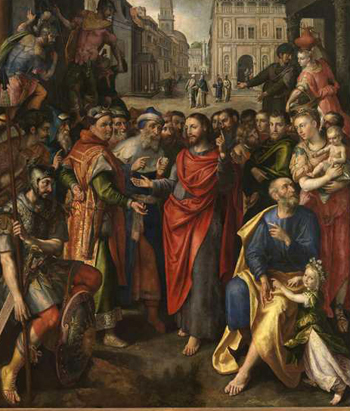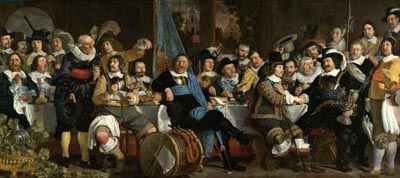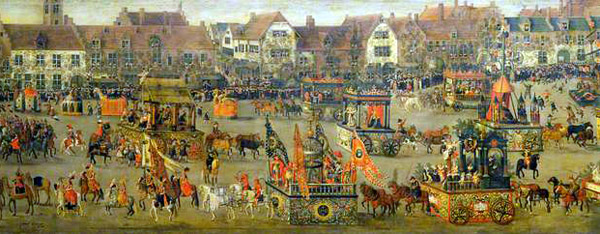Organic Society
 |
 |
 |
 |
 |
 |
 |
The Family: Vital Principle of the Guilds
Someone could ask me this question about the Middle Ages: What are the psychological effects that the family, the guilds and the religious associations had on their members that led them to love temperance, order and stability?
 The main factor that effected everything in the Middle Ages was the family. Before anything else, it was the family that gave the idea of unity. Naturally, since the family was Catholic, that element of unity acquired a supernatural aspect with an incomparably greater strength, higher richness and deeper meaning. Although we cannot say that the Church is made up of families – she is composed of souls – we can affirm that the civil society is composed of families.
The main factor that effected everything in the Middle Ages was the family. Before anything else, it was the family that gave the idea of unity. Naturally, since the family was Catholic, that element of unity acquired a supernatural aspect with an incomparably greater strength, higher richness and deeper meaning. Although we cannot say that the Church is made up of families – she is composed of souls – we can affirm that the civil society is composed of families.
The influence of families penetrated the guilds, churches and other organizations in a particular way: It generally happened that three or four families had a dominant influence on various sectors of the social activity of a city. In this way, the spirit of the family held sway in those organizations as well.
Thus, the love and affinity that existed in the family extended to the other organizations. We can say that the great merit of those various associations was to be permeable to the influence of families, and not just of individuals. This favored the circulation of the spirit of the family in society.
Regarding temperance, we can then ask to what degree a man is inclined to temperance in his life and to what degree grace is necessary to have a life of temperance.
 We can teach in a catechism class what temperance is and give this instruction: “You must practice temperance.” This has a certain effect.
We can teach in a catechism class what temperance is and give this instruction: “You must practice temperance.” This has a certain effect.
However, in a family where this virtue is practiced, it is taught instinctively. The life of that family is a living school of temperance. In accordance with its own temperament, each family has its own way to properly practice temperance. It also has its own way to be immoderate; but if the family is Catholic, its better members will fight this defect.
This correction is often exercised in a curious way: When the father and the mother come from different families, the father tries to correct in the children the bad consequences of the intemperance that comes from the mother’s family; vice-versa, when the father is not present, the mother corrects the bad fruits of the intemperance coming from his family.
When the mother notices a defect in one of her children and the father is not present, she tells the child, “Do not act like your Uncle Edward.” The examples that she points out to be avoided are more often those of the father’s relatives than her own. Reciprocally, the father does the same with regard to her defects.
This is a way to balance the bad influences and to improve the practice of temperance in the family in a concrete, not abstract, way. This way of passing temperance to the children is grounded in reality and has a practical sense that the theoretical teaching on temperance lacks.
The rural clans
As the rural clans grew, they extended their boundaries and migrated to the cities. In the countryside they had their own customs and laws based on the ways the families organized their work. In the cities the clans formed guilds, which still found their roots in the families and their common work.
This description suggests that inside the families there was a very strong consensus, which was the vital principle that spontaneously gave birth to a system of working together. The result was the guilds.
It can be difficult for us to understand this since today's modern family does not engender anything like this. It also has no idea of how family life should be. So then, we have to imagine how authentic family life should be and then try to image the common family sentiment that should exist in all the members.
 How should the concept of the family as well as the sentiment of the family be?
How should the concept of the family as well as the sentiment of the family be?
Only the patriarchal family can give rise to an organic order. I believe it would be futile to look for any other organic starting point for the surge of the family. Why the family? How does the family reach this point? What is this special thing that the family has?
The notions of family and personality used to develop in ways completely different than what we see today. Based on the link of consanguinity, the family creates conditions in which a person is never completely different from the others. That is, the members of a family feel a similarity to the other members in many points that are very deep, often without even consciously realizing it.
This affinity corresponds to a profound need of human nature, born from sociability itself. It results from the fact that each one of us has the need to live in a society where he finds many similar persons with whom he has conaturality and a consensus of opinions.
This consensus flows from a common temperament resulting from a long tradition that developed in that family.
Another factor is the history of the family. Each family has its own history. It is not only the history of an individual inside the family; it is a whole collective history that constitutes the many victories, successes, failures and dramas which involved the entire family. These factors create an ambience around the individual that is the psychological air he breathes and inside which he lives. In it he finds his normality.
The consequence of this conception is that the individual can neither understand nor imagine his life outside the family. He also cannot conceive his interests as dissociated from the interests of the family. He would consider this a monstrosity; for him it would be like death.
 Continued
Continued

Posted April 1, 2019

The guild buildings in Brussels:
the framework for the life of the people
The influence of families penetrated the guilds, churches and other organizations in a particular way: It generally happened that three or four families had a dominant influence on various sectors of the social activity of a city. In this way, the spirit of the family held sway in those organizations as well.
Thus, the love and affinity that existed in the family extended to the other organizations. We can say that the great merit of those various associations was to be permeable to the influence of families, and not just of individuals. This favored the circulation of the spirit of the family in society.
Regarding temperance, we can then ask to what degree a man is inclined to temperance in his life and to what degree grace is necessary to have a life of temperance.

The altarpiece of the Guild of Minters reads: ‘Give to Caesar what is Caesar’s and to God what is God’s’
However, in a family where this virtue is practiced, it is taught instinctively. The life of that family is a living school of temperance. In accordance with its own temperament, each family has its own way to properly practice temperance. It also has its own way to be immoderate; but if the family is Catholic, its better members will fight this defect.
This correction is often exercised in a curious way: When the father and the mother come from different families, the father tries to correct in the children the bad consequences of the intemperance that comes from the mother’s family; vice-versa, when the father is not present, the mother corrects the bad fruits of the intemperance coming from his family.
When the mother notices a defect in one of her children and the father is not present, she tells the child, “Do not act like your Uncle Edward.” The examples that she points out to be avoided are more often those of the father’s relatives than her own. Reciprocally, the father does the same with regard to her defects.
This is a way to balance the bad influences and to improve the practice of temperance in the family in a concrete, not abstract, way. This way of passing temperance to the children is grounded in reality and has a practical sense that the theoretical teaching on temperance lacks.
The rural clans
As the rural clans grew, they extended their boundaries and migrated to the cities. In the countryside they had their own customs and laws based on the ways the families organized their work. In the cities the clans formed guilds, which still found their roots in the families and their common work.
This description suggests that inside the families there was a very strong consensus, which was the vital principle that spontaneously gave birth to a system of working together. The result was the guilds.
It can be difficult for us to understand this since today's modern family does not engender anything like this. It also has no idea of how family life should be. So then, we have to imagine how authentic family life should be and then try to image the common family sentiment that should exist in all the members.

In 1648, the Treaty of Münster ending the war with Spain was celebrated at a banquet of the Amsterdam crossbowmen’s guild
Only the patriarchal family can give rise to an organic order. I believe it would be futile to look for any other organic starting point for the surge of the family. Why the family? How does the family reach this point? What is this special thing that the family has?
The notions of family and personality used to develop in ways completely different than what we see today. Based on the link of consanguinity, the family creates conditions in which a person is never completely different from the others. That is, the members of a family feel a similarity to the other members in many points that are very deep, often without even consciously realizing it.
This affinity corresponds to a profound need of human nature, born from sociability itself. It results from the fact that each one of us has the need to live in a society where he finds many similar persons with whom he has conaturality and a consensus of opinions.
This consensus flows from a common temperament resulting from a long tradition that developed in that family.
Another factor is the history of the family. Each family has its own history. It is not only the history of an individual inside the family; it is a whole collective history that constitutes the many victories, successes, failures and dramas which involved the entire family. These factors create an ambience around the individual that is the psychological air he breathes and inside which he lives. In it he finds his normality.
The consequence of this conception is that the individual can neither understand nor imagine his life outside the family. He also cannot conceive his interests as dissociated from the interests of the family. He would consider this a monstrosity; for him it would be like death.

The organic life of a city can be seen in the Ommeganck in Brussels in 1615:
The Procession of the Guilds

Posted April 1, 2019
Organic Society was a theme dear to the late Prof. Plinio Corrêa de Oliveira. He addressed this topic on countless occasions during his life - at times in lectures for the formation of his disciples, at times in meetings with friends who gathered to study the social aspects and history of Christendom, at times just in passing.
Prof. Plinio
Atila S. Guimarães selected excerpts of these lectures and conversations from the transcripts of tapes and his own personal notes. He translated and adapted them into articles for the TIA website. In these texts fidelity to the original ideas and words is kept as much as possible.






